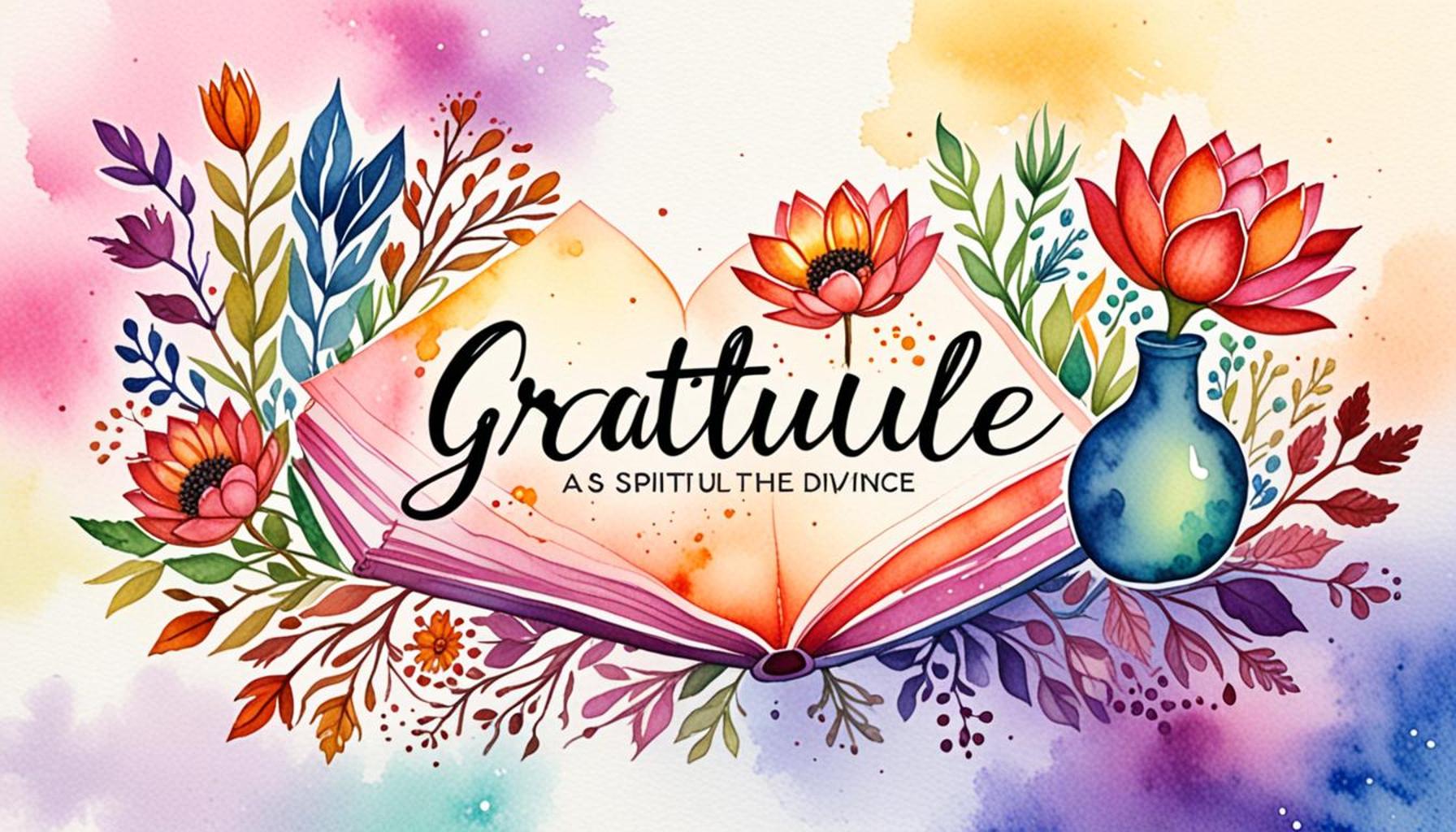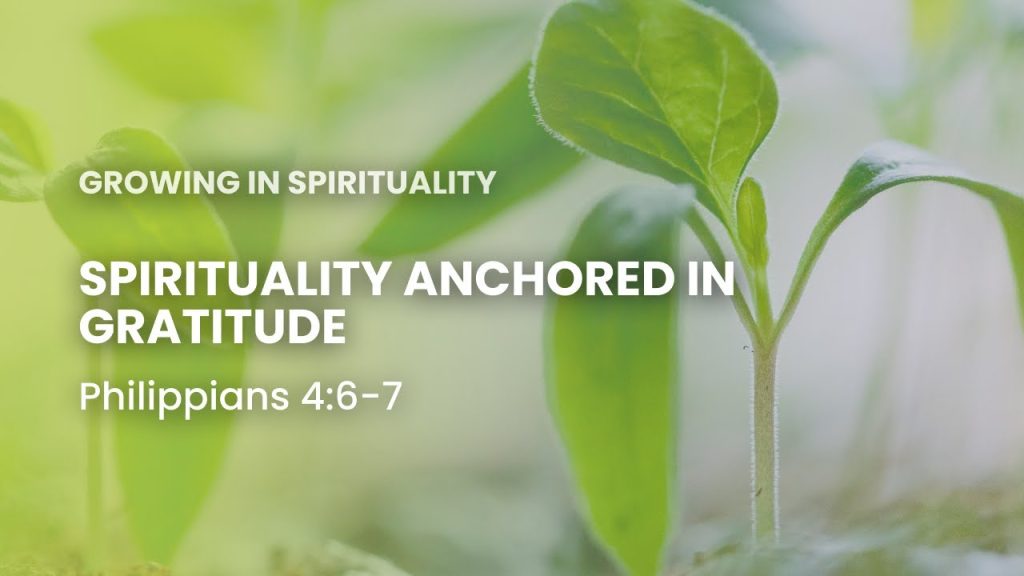Gratitude as Spiritual Practice: Connecting with the Divine Through Recognition

The Power of Gratitude in Spiritual Growth
Gratitude is a deeply transformative practice that transcends mere politeness. In fact, it can be a potent spiritual practice that cultivates a profound connection with the divine. In a world often filled with distractions and stress, taking time to acknowledge and appreciate the myriad blessings around us can serve as a therapeutic antidote. This practice invites a moment of reflection, urging us to embrace the present and to recognize the richness of our experiences.
The Benefits of Practicing Gratitude
- Enhances Spiritual Awareness: Engaging in gratitude shifts our focus, allowing us to notice the divine presence in our everyday lives. It transforms our perception and helps us appreciate the beauty in ordinary moments.
- Strengthens Community Bonds: When we express gratitude, it reinforces social ties and fosters unity within our communities. For instance, in many Nigerian cultures, communal appreciation is integral; acts of gratitude are often expressed during celebrations and communal gatherings, reflecting values upheld for generations.
- Promotes Emotional Healing: A heart filled with gratitude can heal emotional scars. When we reflect on what we appreciate, we create space for joy, compassion, and balance, contributing to our overall well-being.
In Nigeria, where spiritual traditions and communal ties are rich, integrating gratitude into daily life can provide profound benefits. Many individuals participate in rituals that honor the bounty of nature and the strength of their communities. For example, during festivities like the New Yam Festival, expressions of gratitude toward the earth and ancestors are prominent, reinforcing the values of appreciation and remembrance.
Exploring Gratitude Practices
There are numerous ways to embrace gratitude as part of one’s spiritual journey, including:
- Journaling: Keeping a gratitude journal allows you to articulate your thankfulness clearly. Writing down daily reflections can enhance clarity and focus, serving as a reminder of the good in your life.
- Prayer: Engaging in prayers of gratitude establishes a deeper spiritual connection. Whether shared in a traditional setting or silently in solitude, saying thank you in your prayers allows for a personal dialogue with the divine.
- Acts of Kindness: Sharing what you are grateful for with others magnifies that gratitude. Acts of kindness not only reflect your acknowledgment of life’s gifts but also inspire a ripple effect, encouraging others to express their gratitude.
By weaving gratitude into our daily spiritual practices, we cultivate the roots of our relationship with the divine. This commitment to appreciation can lead to significant transformations, enhancing our lives and the lives of those around us. As we become more attuned to the power of gratitude, we may discover that it not only enriches our spiritual journey but also revitalizes our communities, fostering a culture of appreciation and connection. In this way, gratitude becomes a powerful practice that nourishes both the individual and the collective spirit.
SEE ALSO: Click here to read another article

Embarking on a Journey of Gratitude
Practicing gratitude is more than just an act; it’s a transformative journey that opens the heart to awareness. By consciously recognizing what we are thankful for, we begin to connect deeply with the divine energies that surround us. Each expression of gratitude serves as a channel, revealing the interconnectedness of all existence, especially evident in the rich tapestry of Nigerian culture where spirituality and community go hand in hand.
The Spiritual Significance of Gratitude
In many spiritual traditions, gratitude is viewed as a practice that uplifts the soul and fosters a deeper connection with the divine. In Nigeria, various indigenous beliefs emphasize the importance of acknowledging the forces of nature, ancestors, and the community as vital components of spiritual connectivity. Here, gratitude becomes a sacred form of recognition that enhances our perception of life’s myriad gifts.
One compelling aspect of gratitude is the emotional release it provides. By fostering a sense of appreciation, individuals can alleviate feelings of anxiety and despair, creating a fertile ground for spiritual growth. Research suggests that regularly engaging in gratitude can lead to improved mental health, greater satisfaction in relationships, and even a more profound sense of purpose. In this way, expressing gratitude can be akin to a prayer, where each acknowledgment becomes a small offering to the universe.
Integrating Gratitude into Daily Routines
Integrating gratitude into daily life is not just beneficial; it is also accessible to anyone seeking spiritual enrichment. Below are some effective methods for practicing gratitude:
- Mindful Breathing: Begin each day by taking a few moments to breathe mindfully. As you inhale, visualize inhaling peace, and as you exhale, let go of negativity. Following this, silently list three things you are grateful for. This sets a positive tone for the day ahead.
- Gratitude Rituals: Create a personal ritual or participate in communal ones that celebrate gratitude. In Nigeria, practices during festivities, such as offering thanks to the ancestors during the New Yam Festival, highlight culturally rich expressions of thanks and reconnect individuals with their lineage.
- Daily Affirmations: Using affirmations to express gratitude can serve as a powerful reminder of your various blessings. Statements like “I am thankful for the love of my family” or “I appreciate the beauty of nature” help anchor your awareness on the positive aspects of life.
As we incorporate these practices into our lives, we enhance our ability to appreciate the small joys that often go unnoticed. The act of gratitude, when practiced consistently, evolves from a simple acknowledgment of life’s gifts into a profound vehicle of spiritual awakening. In doing so, we may discover that gratitude is not just an emotion but a spiritual lens through which we observe the world, ultimately fostering a deeper connection with the divine.
| Advantage | Description |
|---|---|
| Emotional Healing | Practicing gratitude can significantly contribute to emotional well-being, fostering forgiveness and easing emotional pain through recognition of positive experiences. |
| Enhanced Spiritual Connection | Acknowledging life’s blessings encourages a deeper connection to the divine, opening pathways for spiritual insights and personal growth. |
Engaging in gratitude as a spiritual practice can transform our perspective on life. When we consciously embrace recognition of both small and significant aspects of our existence, we invite a profound sense of appreciation that resonates on multiple levels. As we cultivate this awareness, it’s not just our mindset that shifts; our emotions enliven, connecting us to a greater universal purpose.Moreover, research indicates that people who practice gratitude regularly exhibit lower levels of stress and higher satisfaction in personal relationships, creating a ripple effect that enhances community ties. This phenomenon illustrates how gratitude can serve as a gateway to fostering connections not only with ourselves but also with others and the greater universe. Thus, the journey of embracing gratitude is more than a mere acknowledgment; it is an essential step toward establishing a harmonious relationship with the divine, underscoring the importance of finding moments of appreciation in everyday life. As you delve into this practice, consider the various ways to express thanks and recognize the role it plays in transforming your spiritual journey.
ADDITIONAL INSIGHTS: Expand your understanding here
The Ripple Effects of Gratitude in Community
The practice of gratitude does not just elevate the individual; its effects can resonate throughout entire communities. In Nigeria, where communal relationships are pivotal, practicing gratitude reinforces bonds and fosters collective well-being. When individuals express gratitude, they inspire others to do the same, creating a ripple effect of appreciation and acknowledgment. The Yoruba and Igbo communities often celebrate their achievements through communal thanks, reinforcing shared values and interconnectedness.
Gratitude as a Catalyst for Forgiveness
A profound yet often overlooked aspect of gratitude is its power to foster forgiveness. When we adopt a grateful mindset, we can shift our focus from perceived wrongs or grievances to recognizing the good present in our lives. This shift is particularly significant in a diverse society like Nigeria, where conflicts can arise between ethnic groups and within families. By practicing gratitude, individuals may find it easier to let go of resentments and embrace forgiveness, paving the way for healing and reconciliation. Studies have shown that individuals who regularly express gratitude are more likely to forgive others, thus contributing to a more harmonious society.
The Role of Storytelling in Gratitude
Storytelling serves as a powerful medium for expressing gratitude, deeply rooted in Nigerian culture. From oral traditions to contemporary narratives, expressing thanks through story fosters collective identity and shared experiences. The Fulani and Hausa people, for example, tell stories of unity and gratitude to honor elders and ancestors who paved the way for future generations. These stories emphasize community resilience and serve to remind individuals of the blessings they inherit from the past. By sharing stories of gratitude, we not only honor those who have come before us, but we also create a shared space for recognizing life’s gifts.
Gratitude and Nature: A Deep Spiritual Connection
The natural environment is an abundant source of inspiration for gratitude. In Nigeria, the landscapes – from the lush greenery of the rainforest to the serene rivers and mountains – offer a constant reminder of beauty and splendor. Many spiritual practices encourage individuals to express gratitude towards the earth for its resources and sustenance. The idea of “giving back” to nature is reflected in various indigenous rituals, where offerings are made to the land, signifying respect and appreciation for its life-giving properties. This reciprocal relationship with the environment enhances spiritual connectivity, urging individuals to recognize their role within the larger ecosystem.
Harnessing Technology for Gratitude
In an age where technology pervades daily life, powerful tools can facilitate gratitude practices. Social media platforms, blogs, and apps focused on gratitude can offer individuals a space to share their reflections, experiences, and acts of thanks. These platforms create communities centered around recognition and appreciation, enabling connections across geographical boundaries. For instance, a hashtag campaign promoting gratitude in Nigeria could highlight local heroes, community leaders, or everyday acts of kindness, emphasizing the importance of recognizing even the smallest blessings.
As we explore the multifaceted dimensions of gratitude, it becomes clear that this practice transcends mere words—it is a commitment to a higher level of awareness and existence. By embracing gratitude as a spiritual practice, individuals can not only transform their inner lives but also contribute to the collective consciousness, enriching the cultural fabric of Nigerian society.
ADDITIONAL INSIGHTS: Expand your understanding here
Embracing Gratitude as a Pathway to Spiritual Connection
In conclusion, the practice of gratitude emerges not merely as a fleeting expression of thanks, but as a profound spiritual practice deeply embedded in our collective consciousness. It empowers individuals to connect with the divine through the act of recognition—acknowledging the gifts and blessings present in their lives, no matter how small. This recognition fosters an enriching relationship with ourselves, our communities, and even the natural world.
As we have explored, gratitude holds the key to transformative concepts such as forgiveness, unity, and resilience, particularly within the rich tapestry of Nigerian culture. By embracing gratitude, individuals not only uplift their own spirits but also foster an environment of goodwill, healing, and interconnectedness. The role of storytelling within communities amplifies this practice, as it allows for shared narratives of thankfulness and appreciation that reinforce social bonds.
Moreover, in today’s technology-driven world, innovative platforms offer new avenues to share expressions of gratitude, breaking geographical barriers and enabling global conversations about appreciation and acknowledgment. These collective efforts signal a burgeoning movement towards a grateful society, where acts of kindness and recognition become woven into the cultural fabric.
Ultimately, by making gratitude a central tenet of our lives, we open ourselves to a deeper spiritual connection, inviting the divine into our everyday experiences. As we cultivate this practice, we cannot underestimate its potential to create ripple effects, not just within ourselves, but throughout communities. Let us commit to recognizing and appreciating the beauty that surrounds us, fostering a spirit of gratitude that connects us all.


